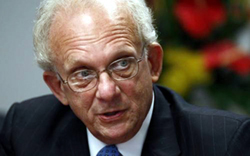REPS. BERMAN, PETERS, SCHIFF, AND ESHOO OFFER CONGRESSIONAL STATEMENTS MARKING SUMGAIT MASSACRES
Rep. Cicilline Offers Press Statement Marking Tragedy
February 28, 2012WASHINGTON, DC – Representatives Gary Peters (D-MI), Howard Berman (D-CA), Anna Eshoo (D-CA) and Adam Schiff (D-CA) have offered U.S. House floor statements over the past week marking Azerbaijan’s pogroms and massacres against ethnic Armenian civilians in Sumgait, Kirovabad, and Baku, reported the Armenian National Committee of America (ANCA).
These four legislators join with Rep. Frank Wolf (R-VA), the Co-Chairman of the Congressional Human Rights Caucus, and Judy Chu (D-CA), who made Congressional statements regarding these massacres earlier this month, and with Congressman David Cicilline (D-RI), who issued a public statement this week marking these human rights atrocities.
“We join with friends of Armenia and advocates of human rights from California, Michigan, Rhode Island, Virginia and across America in thanking each of Members of Congress who has joined with Armenians worldwide in marking the Sumgait, Kirovabad, and Baku pogroms,” said ANCA Executive Director Aram Hamparian. “In pausing to remember these atrocities we reaffirm our commitment to challenging Azerbaijan’s aggression and threats of renewed war, and, more broadly, to protecting the innocent and promoting peace for all the peoples of the Caucasus region.”
In his statement, Congressman Howard Berman, the Ranking Democrat on the House Foreign Affairs Committee, warned his House colleagues about “Azerbaijan’s rapidly growing military budget and its increasing bellicosity toward Armenian populated Nagorno- Karabakh.” He cited, in particular, public boasts by Azerbaijan’s President, Ilham Aliyev, that “Azerbaijan’s defense budget is twenty times larger than it was just eight years previously and larger, in fact, than the entire budget of Armenia.” In closing, Congressman Berman called the attention of his fellow legislators to the “videotaped evidence of the Azerbaijani government’s December 2005 systematic desecration and destruction of an ancient Armenian cemetery, including thousands of intricately-carved grave-stones in Djulfa, in a section of Azerbaijan near the Turkish border. I believe our State Department still has not adequately examined this incident, and I call on it to do so.”
Congressman Gary Peters, in his remarks, offered last week, educated his colleagues about how, in February of 1988, “hundreds of Armenians were singled out, driven from their homes, and murdered by Azerbaijani rioters. Despite Sumgait’s proximity to security forces in the capital city, the riots and destruction continued for three days unabated. Credible sources report that hundreds of Armenians were killed or wounded; Soviet officials at the time acknowledged 30 deaths and 200 injured.” He added that, “This tragedy did not go unrecognized at the time. Several U.S. Senators rose to speak out against this violence. They sent letters to the government of the Soviet Union. The Senate unanimously passed an amendment urging the Soviet government to respect the aspirations of the Armenian people and urging it to discontinue its serious violations of human rights.”
In his remarks, Rep. Schiff, a lead author of the Armenian Genocide Resolution, reviewed the facts of Azerbaijan’s pogroms, and underscored for his Congressional colleagues that: “These pogroms were only part of a pattern of anti- Armenian activities occurring throughout Azerbaijan setting the stage for two decades of aggression during which the Azerbaijani government initiated a war against the people of Nagorno- Karabakh. Thousands of people lost their lives and hundreds of thousands of Armenians were displaced as a result of the fighting. A once thriving population of 450,000 Armenians living in Azerbaijan virtually disappeared.” Congressman Schiff added that “a cease-fire agreement, brokered in 1994, remains in place today. However, Azerbaijan’s continued war-mongering, recent cease-fire violations, and dramatic increase of its military budget threaten to destabilize the Nagorno- Karabakh peace talks.”
Congresswoman Anna Eshoo, one of two Members of Congress of Armenian heritage, shared with her colleagues that this remembrance was “a very personal remembrance,” adding that, “My own family fled the slaughter of the Armenian Genocide under the Ottomans, and when we learned of the massacres against Armenians in 1988, we saw history repeating itself. These vicious acts of murder targeted at ethnic groups, must be forcefully condemned whenever and wherever we see them. Yet 96 years after the slaughter of Armenians the U.S. House of Representatives has yet to officially recognize the Armenian genocide. Without our recognition and our forceful condemnation, the cycle of violence will continue.”
In a public February 27th statement issued by his Congressional office, U.S. Rep. David Cicilline offered a moving remembrance of the Armenian victims of Azerbaijan’s pogroms: “More than two decades ago today, innocent Armenian men, women, and children living in Sumgait were subjected to heinous, organized brutality that sought to force them from their homes in Azerbaijan. We remember those victims today, as well as those who were targeted in other pogroms in Kirovabad and Baku. As we remember the victims of these senseless atrocities, let us never forget our responsibility to one another as members of the human race and the importance of standing up to abuse or discrimination wherever it occurs.”
To view a five-page Fact Sheet “Azerbaijani Massacres Against Armenians of Sumgait, Kirovabad, and Baku: 1988 – 1990,” and a one-page set of policy recommendations for U.S. diplomats working for a fair and lasting peace in the Caucasus, visit:
https://www.anca.org/assets/pdf/misc/sumgait_baku_factsheet.pdf
The full text of the Congressional statements by Reps. Schiff, Berman, Eshoo, and Peters are provided below, as is the public statement offered by Congressman Cicilline.
Click here to read statements by Representatives Wolf and Chu offered in early February.
 HON. HOWARD L. BERMAN OF CALIFORNIA
HON. HOWARD L. BERMAN OF CALIFORNIA
IN THE HOUSE OF REPRESENTATIVES
Monday, February 27, 2012
Mr. BERMAN: Mr. Speaker, two of the least noticed and most dangerous trends of recent years have been Azerbaijan s rapidly growing military budget and its increasing bellicosity toward Armenian populated Nagorno- Karabakh.
Last June, during Azerbaijan s largest military parade since the Soviet era, President Aliyev vowed to avenge the deaths of Azerbaijani soldiers killed during the 1988 1994 Nagorno- Karabakh war and declared that “the war isn’t over yet; only the first stage is over.” He then boasted that Azerbaijan s defense budget is twenty times larger than it was just eight years previously and larger, in fact, than the entire budget of Armenia,
Mr. Speaker, it is particularly appropriate that today, February 27 – the anniversary of the 1988 Azerbaijani pogrom directed against its own Armenian population in Sumgait – that we commit ourselves to stopping these ugly threats. Armenian history is drenched in tragedy. Everybody knows about the Armenian Genocide, even if, sadly, only a minority of my colleagues has been willing to recognize it officially. But fewer know about the hundreds of thousands of Armenians murdered under the Ottoman regime in the nineteenth century. And fewer still, it seems, know about the pogroms and ethnic cleansing that Armenians living in Azerbaijan suffered at the hands of Azerbaijanis as the Soviet Union was breaking up.
The Sumgait pogrom that we recall today lasted three days and resulted in the murder of hundreds of Armenian civilians. Other anti- Armenian pogroms took place in Kirovobad November 21 27, 1988, and in the Azerbaijani capital Baku January 13 19, 1990. During this era, there were media reports of Armenians being hunted down and killed in their homes. The systematic pattern of all these attacks suggested that something even more sinister than a mob uprising was at work.
Mr. Speaker, Azerbaijan seems bent on destroying every last vestige of the Armenian presence in Azerbaijan For example, there is videotaped evidence of the Azerbaijani government’s December 2005 systematic desecration and destruction of an ancient Armenian cemetery, including thousands of intricately-carved grave-stones in Djulfa, in a section of Azerbaijan near the Turkish border. I believe our State Department still has not adequately examined this incident, and I call on it to do so.
Today is a solemn day as we recall this history of murder, displacement, and destruction, but it is this very history that underscores the importance of self-determination for Nagorno- Karabakh. I call on the Administration to press the Azerbaijani government to cease its bellicose rhetoric and to stop its headlong rush to war now and to adhere strictly to the principled basis of the Minsk Process, namely, the search for a peaceful, negotiated solution for Nagorno- Karabakh I likewise call on the Administration to redouble its efforts to achieve a solution for Nagorno- Karabakh And, on this day when we once again reflect on the brutality Armenians have suffered, and endured, for centuries, I once again call on the Administration simply to acknowledge history and to recognize the Armenian Genocide.
 HON. GARY C. PETERS OF MICHIGAN
HON. GARY C. PETERS OF MICHIGAN
IN THE HOUSE OF REPRESENTATIVES
Friday, February 17, 2012
Mr. PETERS: Mr. Speaker, I rise today to remember the Armenian victims of the Sumgait, Kirovabad, and Baku pogroms who were killed in Azerbaijan in the late 1980s and early 1990s. As the United States stood as a beacon for freedom around the world, the Soviet Union suffered from ethnic strife and internal unrest. Communist ideology and a command economy could not hold together the Soviet republics and their diverse ethnic groups. The Soviet Union–despite its rhetoric–failed to protect and ensure the rights of its ethnic minorities, especially the ethnic Armenians who were targeted in pogroms in Azerbaijan.
In February 1988 hundreds of Armenians were singled out, driven from their homes, and murdered by Azerbaijani rioters. Despite Sumgait’s proximity to security forces in the capital city, the riots and destruction continued for three days unabated. Credible sources report that hundreds of Armenians were killed or wounded; Soviet officials at the time acknowledged 30 deaths and 200 injured.
This tragedy did not go unrecognized at the time. Several U.S. Senators rose to speak out against this violence. They sent letters to the government of the Soviet Union. The Senate unanimously passed an amendment urging the Soviet government to respect the aspirations of the Armenian people and urging it to discontinue its serious violations of human rights.
In Kirovabad later that same year Armenians were once again targeted. My friend and colleague from Michigan, Representative Sander Levin, joined 11 other members of the House and Senate to write to Soviet Premier Mikhail Gorbachev in advance of his historic trip to the United States urging him to protect the Armenians living in Azerbaijan.
Unfortunately, in January 1990 in the Azerbaijani capital of Baku, Armenians were once again targeted in a weeklong pogrom. Civil society called upon the Azerbaijan government to respect the rights of, and prevent crimes against, its Armenian minority population.
Today, I rise to remember the victims and honor their memories. America has always stood for democratic freedom and human rights–whether then during the Cold War–or today during the historic transition in the Middle East. Democracies cannot flourish without respecting the rights of the minority. Twenty-four years later it is important that we not forget the victims of Sumgait, Kirovabad, and Baku. I call upon the countries in the region to respect the human rights of all residents–whether majority or minority–and to ensure that these events never happen again.
 HON. ADAM B. SCHIFF OF CALIFORNIA
HON. ADAM B. SCHIFF OF CALIFORNIA
IN THE HOUSE OF REPRESENTATIVES
Monday, February 27, 2012
Mr. SCHIFF: Mr. Speaker, I rise today to commemorate the scores of Armenian lives lost in the vicious attacks perpetrated by Azerbaijani pogroms against Armenian civilians in the town of Sumgait, Azerbaijan 24 years ago. Beginning on February 27, 1988 and for three days, Azerbaijani mobs assaulted and killed Armenians. Hundreds of Armenians were wounded, women and young girls were brutally raped, and victims of all ages were beaten and tortured and eventually burned to death. Thousands were driven from their homes and forced to become refugees. Armenian homes and businesses were left to be looted and destroyed.
In the years that followed this heinous event, Armenians living in Kirovabad and Baku suffered a similar fate. These pogroms were only part of a pattern of anti- Armenian activities occurring throughout Azerbaijan setting the stage for two decades of aggression during which the Azerbaijani government initiated a war against the people of Nagorno- Karabakh Thousands of people lost their lives and hundreds of thousands of Armenians were displaced as a result of the fighting. A once thriving population of 450,000 Armenians living in Azerbaijan virtually disappeared.
A cease-fire agreement, brokered in 1994, remains in place today. However, Azerbaijan’s continued war-mongering, recent cease-fire violations, and dramatic increase of its military budget threaten to destabilize the Nagorno- Karabakh peace talks. In January 2008, Azerbaijani President Ilham Aliyev warned Armenians living in Nagorno- Karabakh “We are reinforcing our army because we must be ready to free our lands . . . at any moment and by any means.” Such rhetoric is detrimental to the peace process and is further evidence that this conflict is ongoing and must be resolved. It is my sincerest hope that a democratic and peaceful resolution can be reached, and Nagorno- Karabakh s right to self-determination affirmed.
This April will mark the 97th anniversary of the Armenian Genocide, an event the Turkish government, Azerbaijan s closest ally, goes to great and tragic lengths to deny. We must not let such crimes against humanity go unrecognized. Today, let us pause to remember the victims of the atrocities of the Sumgait pogroms. Mr. Speaker, it is our moral obligation to condemn crimes of hatred and to remember the victims, in hope that history will not be repeated.
 HON. ANNA G. ESHOO OF CALIFORNIA
HON. ANNA G. ESHOO OF CALIFORNIA
IN THE HOUSE OF REPRESENTATIVES
Monday, February 27, 2012
Ms. ESHOO: Mr. Speaker, February 27th marks the 24th anniversary of a violent and horrific attack against Azerbaijani citizens of Armenian descent. The 1988 attacks began in the town of Sumgait in Soviet Azerbaijan Dozens of Armenians were killed, and hundreds more were wounded. During what even the Soviet government officially described as a “pogrom”—an organized massacre of helpless people – Armenian women and children were raped, and people were set on fire and beaten to death, all while police stood by.
Tragically, the events in Sumgait presaged further pogroms in Kirovabad in November of 1988 and Baku in January of 1990. This violence initiated a broader attack against Azerbaijan s Armenian population, resulting in thousands of deaths. The conflict persists today, and the Azeri military blockade of the Nagorno- Karabakh Republic and other aggression sadly continues.
For me, it is also a very personal remembrance. My own family fled the slaughter of the Armenian Genocide under the Ottomans, and when we learned of the massacres against Armenians in 1988, we saw history repeating itself. These vicious acts of murder targeted at ethnic groups, must be forcefully condemned whenever and wherever we see them. Yet 96 years after the slaughter of Armenians the U.S. House of Representatives has yet to officially recognize the Armenian genocide.
Without our recognition and our forceful condemnation, the cycle of violence will continue. Today, Christians and other minority groups are being driven from Iraq by extremists, and the once large and diverse ethnic communities are being eradicated. Without our attention and action by the world community, there will be no end to this senseless violence around the world.
Today, let us remember the Armenians who lost their lives in Azerbaijan in 1988, and pray that the world will finally take greater account of these atrocities and work together. Let us take up the work that our principles demand of us, standing united against ethnic violence, discrimination, extremism and brutality, wherever we find it.
 THE HON. DAVID CICILLINE
THE HON. DAVID CICILLINE
PRESS RELEASE
Monday, February 27, 2012
Cicilline Statement on Anniversary of Pogrom of Armenians in Sumgait
WASHINGTON – From February 26 through March 1, 1988, Armenians living in the town of Sumgait in Soviet Azerbaijan were the targets of systematic violence that resulted in numerous deaths. U.S. Congressman David N. Cicilline (D-RI) issued the following statement today in remembrance of the victims:
“More than two decades ago today, innocent Armenian men, women, and children living in Sumgait were subjected to heinous, organized brutality that sought to force them from their homes in Azerbaijan. We remember those victims today, as well as those who were targeted in other pogroms in Kirovabad and Baku. As we remember the victims of these senseless atrocities, let us never forget our responsibility to one another as members of the human race and the importance of standing up to abuse or discrimination wherever it occurs.”